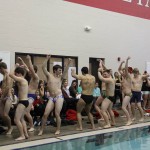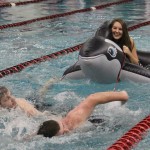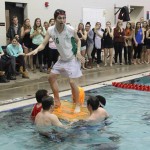Category: News
U.S. veteran calls out military
While the United States military strives to present itself in a shining manner of respect and loyalty, veteran soldier Dennis Laich says that is not always the case.
Laich, a retired major general, spoke on the military and defense technology at the second event for the annual Great Decisions Discussion Series Friday, Feb. 28 at the William Street Methodist Church.
During his presentation, Laich shared the perspectives he gained throughout his years of service.
He touched on some of the principles standard to the U.S. military, as well as taking time to emphasize the financial impact these actions have had.
Shock and awe is the branding of new military technology in the U.S., according to Laich, and the benefits are obvious.
However, he feels that the negatives which come alongside have been mostly pushed to the side.
“After each new technology advancement, our enemies have the opportunity to replicate it or create their own countermeasure,” Laich said.
“The most prominent example of this is the atomic bomb, which was quickly replicated and played a major part in the build up to the Cold War.”
He continued on to show the recent increase in influence of the military-industrial complex.
Laich said he believes that this complex is one of the major driving forces behind military decisions, a belief he backed up with tangible evidence.
He cited the stock jumps in companies such as Boeing, Lockheed, United Technologies and Halliburton, who have seen rises of 218 percent to a whopping 1000 percent since 2002.
“When we first started sending troops into Iraq, if the government had reinstituted a lottery draft, added a war surtax or did both, how long do you think we would have stayed there?” Laich asked the audience.
In addressing questions from the audience, he pointed out current flaws in military operations.
Citing Thomas Jefferson’s quote that “dissent is the highest form of patriotism” Laich said “there are not many senior leaders with my mindset. They can be stubborn, but must be made aware that such an expensive, all volunteer military force can’t be sustained for much longer.”
Laich said the United States is currently one of the top world powers, with the largest and most capable military in the world. Because of that, he said, we must be careful in order for the status quo to continue.
“The U.S. defense budget is larger than the next 14 nations combined and our last two wars that cost us $1.5 trillion we paid for with credit,” Laich pointed out. “This pace of growth is something that we can’t sustain in the long term.”
With involvement from the crowd of local Delawareans, Laich went through the country’s history of military combat since World War II.
He invited the audience to “think of our military like a football team, with each conflict as a game that ended with a win, loss, or tie.
“Now take the major wars we have been involved in and think of these as conference games.”
By the end of the activity, Laich’s point rang clear throughout the audience. The U.S. military ‘football’ team had an overall record of three wins, five loses and three ties, with a conference record of one win, two losses and two ties.
“The record speaks for itself, if you were the owner of this team, would you keep the head coach around?” Laich asked.
While at first it may seem cynical, Laich has made it clear that this skepticism is just what our military needs.
Expert on ‘most trusted man’ trusts AP
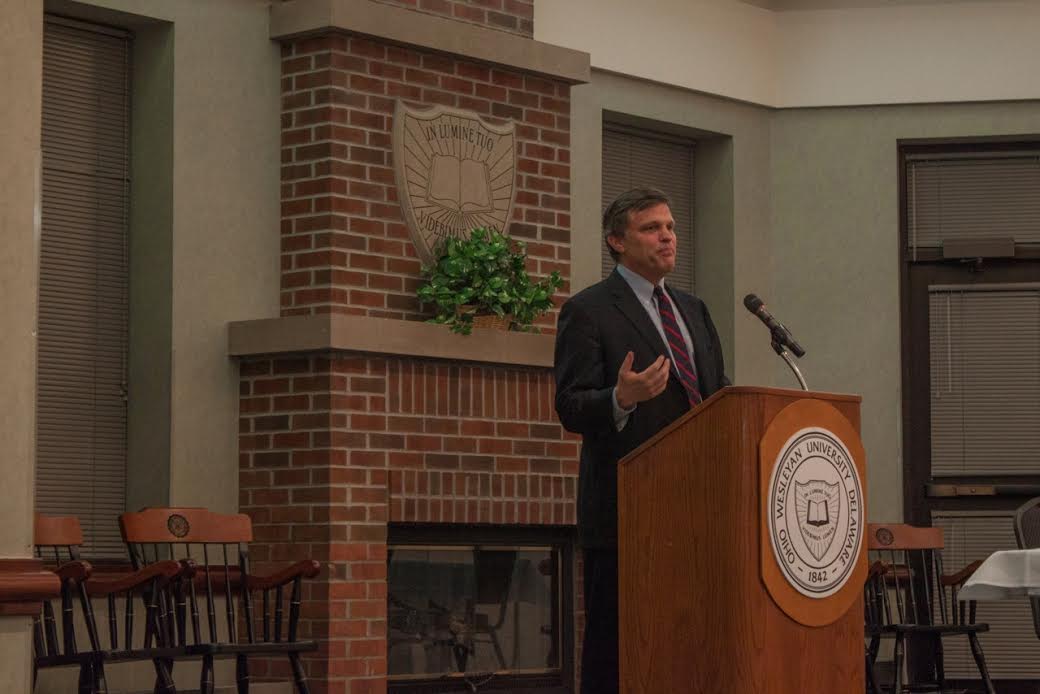
Famed historian and educator Douglas Brinkley, Ph.D., spoke to Ohio Wesleyan students, as well as Delaware city residents last Thursday as this year’s guest speaker for the John Kennard Eddy Memorial Lecture Series.
Brinkley spoke about his latest book, Cronkite, which details the life of Walter Cronkite, the broadcast journalist dubbed by many as “the most trusted man in America.”
Brinkley also discussed the rise of Cronkite’s career, which started with radio and moved into television.
Cronkite’s influence also extended to the public’s opinion on controversial topics, such as the inception of NASA and the Vietnam War.
Following the lecture, Brinkley answered questions from the audience, mediated by Politics & Government professor, Sean Kay.
Some of the questions ranged from, “Which news source does [Brinkley] believe to be the most honest and accurate,” to questions on the 24 hour news cycle, which, according to Brinkley, started with CNN in the early 1980s.
Brinkley also said the news source he trusted the most is the Associated Press.
Junior Avery Winston said he thought it was a very good, informative talk.
“I liked how he used Walter Cronkite to talk about decades of American history,” said Winston.
The John Kennard Eddy Memorial Lecture on World Politics, was founded by OWU student John K. Eddy’s parents after their son was killed in a car crash in 1988.
Holocaust survivor selected as commencement speaker
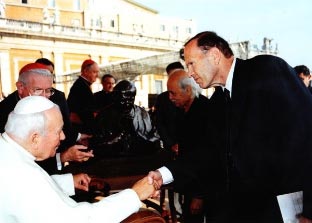
Photo from The Ollendorff Center
When he was an infant, Stephen Ollendorff and his parents escaped Berlin on Kristallnacht. Their landlord warned the family that their apartment would be raided and his maternal grandmother got them airplane tickets to England. The rest of his family — his grandparents, aunt and uncle — did not survive the Holocaust.
Ollendorff and his mother sought refuge in Delaware with Dr. Guy Sarvis, OWU professor of sociology and economics, while his father worked in New York as an ophthalmologist.
On May 11, Ollendorff will return to OWU and be the keynote speaker at the 170th Commencement Ceremony.
Today, Ollendorff, an attorney, is president of the Ollendorff Center for Human and Religious Understanding. The Center’s main goal is to increase awareness of the fundamental issues facing the Jewish people today.
Last year, Ollendorff pledged a five-year, $100,000 donation to fund the Dr. Guy Sarvis Endowed Travel/Research Grant which funds research and travel for students exploring different cultures.
Ollendorff said he plans to deliver a speech that is inspiring to students entering the unknown.
“I thought I would discuss my experiences in meeting the many challenges and opportunities that I faced during my lifetime,” Ollendorff said. “Hopefully, my experiences will assist the graduating class in its decision making process in these very exciting and uncertain times.”
Ollendorff said he was compelled to accept the invitation to speak at commencement because of his appreciation for the university.
“ I feel a very special connection to Ohio Wesleyan because, by establishing the Dr. Guy Sarvis travel/research and award programs, Ohio Wesleyan is reaffirming its proud tradition of cross-cultural understanding and tolerance,” he said. “Professor Sarvis, who has been one of the great influences in my life, was a true pioneer in social justice at a critical time in our country’s history.”
According to Julia Hatfield, senior class council advisor, Ollendorff also donated $2 million to the economics department. She said while his contributions have deepened his connection to the university, they are not the only reason he was selected as the keynote speaker.
“It really depends on what the senior class is interested in,” Hatfield said. “One priority was to get someone who is not necessarily well-known but is known for their work with human rights and global issues.”
Speaker Selection
“We try to get someone who will connect with the senior class,” Peddle said.
Peddle said he met with President Rock Jones several times over the summer to discuss the commencement speaker.
He said he originally wanted someone famous from Hollywood, like Chris Pine or Ellen DeGeneres, but because of schedules and fees, most candidates were not viable for the role.
“Traditionally, the commencement speaker receives no payment or honorarium,” Peddle said. “The university only pays travel fees.”
Peddle said he was often under pressure because he had to keep it a secret. He said once they had information about Ollendorff, people reacted positively when the keynote speaker was revealed on Feb. 13.
President Rock Jones said he is thrilled that the leadership of the senior class selected him as their Commencement speaker.
“His longstanding personal relationship with a member of the OWU family and his commitments to human and religious understanding give him much to say of interest and importance to our graduating seniors,” Jones said.
Looking Forward
Senior Aara Ramesh, Senior Class Council vice president, said the Council found out the same day as the rest of the students. She said she became excited about it when she learned about his connection to the university, his survival of the Holocaust and the organization he founded.
“This is the history major in me talking,” Ramesh said. “I think he’ll bring an element of resilience and faith in a global society.”
Peddle said several students reacted negatively to last year’s commencement speaker because he did not deliver a positive message to the graduates. He said Ollendorff can share a story of success and connect with the graduates.
“I don’t want to hear I’m not going to find a job,” Peddle said. “He (Ollendorff) sought refuge in Delaware, Ohio of all places and overcame a lot and is successful.”
Ramesh said she hopes for a positive message for the graduates.
“Leaving comfort is scary,” Ramesh said. “I hope he’ll get us excited about what’s on the other side of the ceremony because that day, everyone is both scared and pumped.”
Ollendorff earned his B.A. from Columbia University and a Juris Doctor from Columbia Law School. Today, he is an attorney with K&L Gates LLP.
Chartwells makes strides in nutrition, but falls flat
Access to nutritional information for food and drink items offered by Chartwells is limited to those who have smartphones at Ohio Wesleyan University.
Those without such devices are left in the dark about what they’re eating and drinking.
According to a Pew Research poll conducted in May 2013, 79 percent of 18-24 year olds in the US have a smartphone.
The remaining 21 percent of young people without smartphones are without access to Chartwell’s nutritional information app.
According to Gene Castelli, Chartwells’ manager at Ohio Wesleyan University, nutrition information is available through an app called, AppOnCampus, which is available for iOS and Android devices.
While the app does provide nutritional information for food items that are prepared daily at Smith Hall’s Pulse on Dining, and the Hamilton-Williams Marketplace, not everyone on campus can access this information on the go.
Despite Chartwells’ website, (dineoncampus.com) offering the same nutritional information that is provided through the app, it is inconvenient for students without smartphones to access this information.
Junior Kate Hudson said, “I most likely won’t go to the cafeteria to look at [the] food, leave to find a computer to get the facts just to come back again to buy my food.”
Many students who do not have smartphones are saying that they would prefer a print out of nutrition facts for food items and have them displayed near the food.
“There have been plenty of times when I would have liked to know the nutritional info,” said sophomore Cecilia Smith. “And it’s true that if you’re on the spot with a dumb phone, that information isn’t going to be found.”
Smith added, “I’d much rather have the information right in front of me. I hate being the person who has to ask, ‘Oh, do you know what’s in this?’”
Nutrition facts for many food items not available to anyone, even with the app on their smartphones.
Students seeking the nutritional facts for any food item bought anywhere but Smith or the Ham-Wil food court, such as at the University Cafe or the Science Center Food Cart, are flat out of luck. These locations do not disclose the nutritional information of the food they carry.
Other locations where the nutritional facts of food is unknown include the Stuyvesant Hall Cafe, and the cafe in Beeghly Library.
Both the app and the website only provide nutrition facts for the coffee and espresso beverages on the menu.
“With the myriad of fresh offerings made on campus and venues we have across campus, this is the first big major push for items to carry nutritional information,” Castelli said.
“We will continue to build on this in an effort to continue to provide culinary information to our guests.”
Assistant Professor Christopher L. Fink, chairman of the Department of Health and Human Kinetics, said he believes Chartwells’ ought to post nutrition information at each location.
“I think that having information available at the site of purchase would be the best option, since online information requires students to take several steps to access that data,” Fink said. “Steps that probably only the most interested students would take.”
Counseling services welcomes director
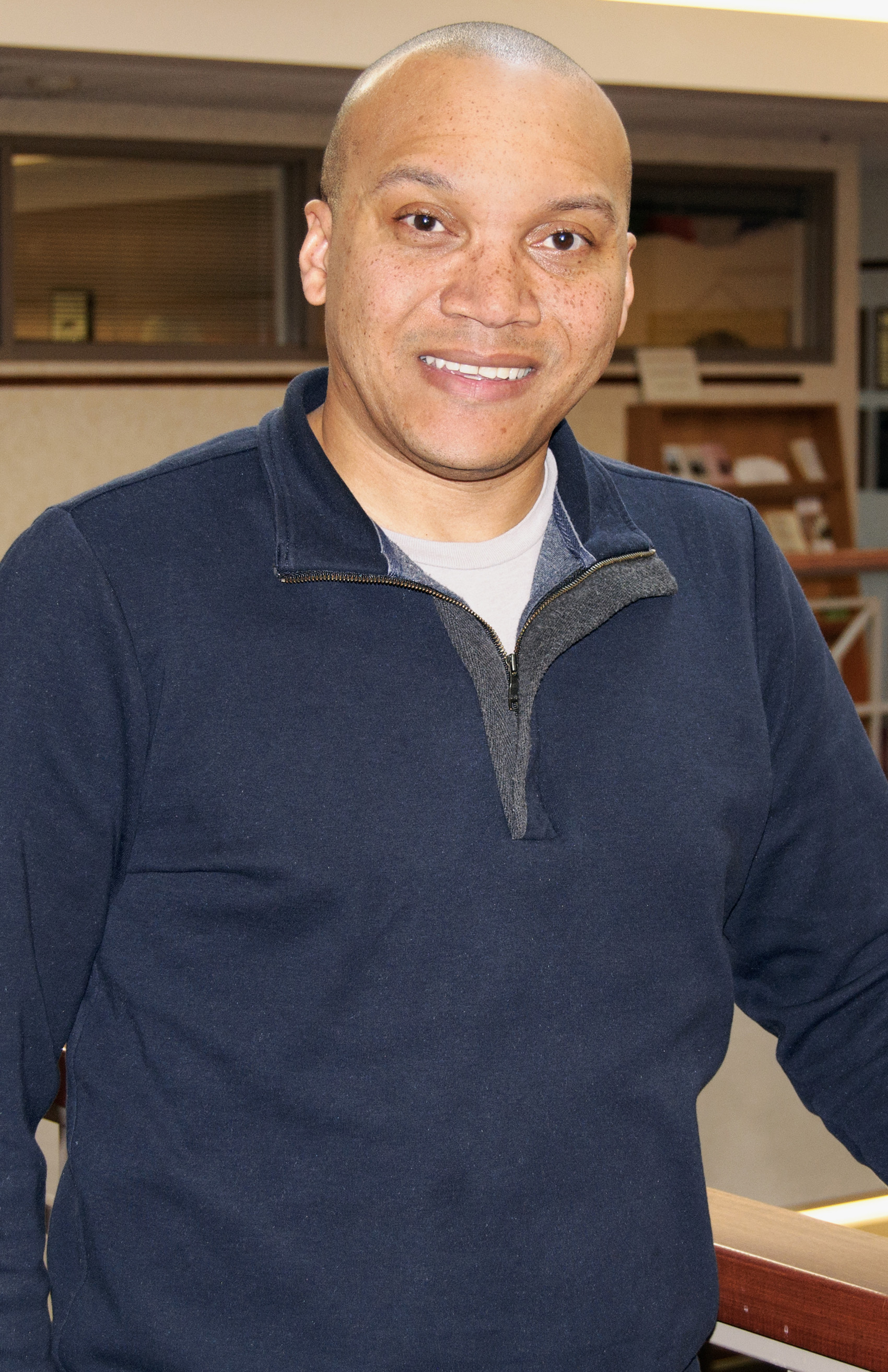
Photo from Communications
After a long and exhaustive search, Counseling Services at Ohio Wesleyan University welcomed its new director, Dr. Doug Bennett, Thursday, Feb. 12.
Dean of Students Kimberlie Goldsberry formally introduced Bennett to staff-members from different departments at OWU in a surprise speech during his reception.
“We’re very excited to have Doug as a part of our family,” Goldsberry said.
Originally from Charleston, S.C., Bennett fulfilled his undergraduate and graduate programs in psychology at the Ohio State University.
“My very first class at Ohio State was Psychology 100, and I knew this was something I wanted to pursue at the time.”
His roots in Ohio come from his parents and brother living in Sharonville, Ohio, a suburb of Cincinnati.
After attaining his doctorate at OSU, Bennett worked as a staff psychologist at the University of Illinois Urbana-Champaign for six years.
Most recently, he served as the assistant director and training coordinator for Counseling and Psychological Services at Purdue University for the past two years.
In addition to being assistant director at Purdue, Bennett also served as a training coordinator for incoming psychologists, including graduate students completing the requirements for their program.
“I have a love of training—especially training grad students completing their internship requirement,” Bennett said.
When comparing the size discrepancies between this campus and the ones he’s previously worked at, Bennett felt he wanted a change and jumped at the opportunity to work at such a close-knit, small school like OWU.
“I’m enjoying the transition to Ohio Wesleyan tremendously,” Bennett said.
“Having been at large universities exclusively throughout my career, the biggest transitions have been in learning of the differences, advantages, and needs of a smaller student body,” Bennett said.
“I have looked forward for some time prior to learning about the Director’s position here to being in a smaller university environment.
“My experiences to this point have not disappointed. The welcome that I have received across campus has been overwhelming positive. I am humbled and thankful to be in this community.”
Counseling Services has been in the process of solving some of the issues students have been having, relating to long waitlists to receive attention, and the inability of those who need immediate help to receive attention in a timely manner.
Last year, students also distributed a petition calling for more attention to be paid to Counseling Services and other organizations having to do with the issue of mental health.
“The future of Counseling Services is bright,” Bennett said.
“My predecessors and the counselors here have left a strong foundation. My staff and I look forward to continuing quality services at OWU. We will focus on innovative ways to assist students seeking assistance through Counseling Services.”
A pre-competition conversation with Pitch Black
The day before their performance, Pitch Black debuted their set to students in Hamilton-Williams Campus Center. Afterwards, I sat down with several members to discuss their goals for ICCA, their nicknames and why they joined.
“Why did you choose those songs and how did you come up with the arrangements?” I ask first.
“The way that we do songs is that anyone in the group can arrange something for us and those just happened to be songs that people in the group were excited to arrange,” says junior Anna Jones, Pitch Black president. “Would anyone who arranged them want to talk about them?”
Junior Brianna Robinson and sophomore Alanna Spalsbury did the arranging, but only Robinson is there.
“I arranged ‘Tonight I’ll Be Your Sweet Dream’ and the reason why it happened is because I was singing ‘Tonight (I’m Lovin You)’ because I was going to arrange that for Pitch Black and my sister just started singing ‘Sweet Dreams’ on top of that,” Robinson says. “I was like, okay, so I just mashed them together.”
“And I know for ‘Can’t Hold Us’ we really wanted to do something that wasn’t really considered a woman’s piece, we wanted to add that girl power – we can rap too,” freshman Kelly Summers adds.
“What goes into arranging a song?” I ask.
“Hours of frustration,” Summers says, and everyone laughs.
“Pretty much what I do, I just listen to songs – I’m a music major, so this comes a little easier I guess,” Robinson explains. “But I just listen to the songs and I listen to the chords and put those chords into each voice part and make chords with each voice part and that’s just how it happens. Just make some different vowel sounds, like ‘doos’ and ‘jadas’ and ‘jinns.'”
“Bow wows,” chimes in sophomore Emma Sparks.
“And it ends up being what it is,” Robinson finishes.
“Experimental work,” Summers concludes.
“How much work did you have to do?” I ask next.
“It didn’t take me very long,” Robinson says.
“It doesn’t take Brianna very long,” echoes sophomore Maeve Nash, vocal percussionist.
“Brianna’s pretty quick,” adds Jones.
“She’s like (this,)” says freshman Taylor Davis, pointing to her head and then miming writing out the notes instantly.
“It depends on the person. I think that’s the best thing to say,” Robinson says modestly.
“And how motivated you are to do it,” Summers adds in.
“Were there other changes to the lyrics, besides the mashups?” I ask.
“In ‘Can’t Hold Us’ we just changed some stuff to make it personalized to us,” Nash says – she would know, she’s one of the lead soloists.
“We say ‘Return of Pitch Black’, ‘My posse’s been on the JAY’ except we’re saying ‘Broadway’ at ICCA cause I don’t think they know what the JAY is. And we say ‘Got that Beyonce dress game and diva in my style.’…Then we say ‘When OWU raised you’ and then ‘Pitch Black ICCA’ instead of ‘And all my people say.'”
I ask what expectations they have for ICCA, and get a lot of responses.
“We expect it to be awesome,” say both Robinson and Jones.
“Yeah, it’ll be so much fun,” Nash says.
“Explosions,” says senior Cara Slotkin; Davis says “Fire.”
“We’re going to have fun, and every year we’ve gotten a better score than the year before, so I think that’s our goal. As long as we do that we’ll be happy,” Jones says.
“And also, just being able to see other groups who do the same thing as us and love just being in a capella, is really, really an awesome experience for us,” Robinson adds.
“It’s really an experience,” Jones tells me.
“How did you do the other two times?” I ask.
“We did not place, but like I said each year we’ve gotten better scores,” Jones says.”…First and second move on, third is like the runner-up, and then they don’t announce the rest.”
“What has to go on to be selected (for Pitch Black)?” I ask.
“There’s an audition process, people come in and sing a few minutes of a song, and then that’s pretty much it,” Jones explains.
Junior Emma Buening adds that they also have prospective members test the vocal scale as well.
Why did you all decide to join, I ask.
“I’ve always loved to sing, and I wanted to do it in an atmosphere that everyone else had a passion for it,” Slotkin says.
“I saw Emily Knobbe (a former Pitch Black officer)…doing this acoustic set the first week of school when I was a freshman,” Buening explains. She tried out after seeing this, but didn’t make it her first time.
For Davis, coming to Ohio Wesleyan and living in a dorm made practicing her singing difficult.
“I walked on the JAY and I saw Pitch Black and I knew and I signed up (for an audition),” she says.
For Nash and sophomore Abby Hanson, their interest in Pitch Black came before they were students.
Hanson saw them perform at an Admissions event and was encouraged to try out by her father.
“I didn’t audition my freshman year but I auditioned this year and I got in and it’s super exciting,” she says.
Nash had a similar experience.
“I decided I wanted to be in Pitch Black before I decided I wanted to go here,” she says. “So I came and I already had red and black stuff just in case I got in.”
A year later, Nash was in class with sophomore Emma Sparks.
“Maeve actually told me about it,” Sparks says. “…I was like, ‘What, that’s here? Yeah I’ll do it.’”
“(I was) Pitch Black before Pitch Perfect was a thing,” says Slotkin, referring to a 2012 comedy movie about college a capella groups – it’s the source of many inside jokes.
“I am a lover of music, that’s the biggest reason,” Robinson tells me last. “Pitch Black, before I was in it, (I saw) it was so good and I saw how everyone who’s in that group just really really just loves to sing together and that’s what I wanted.”
During their performance and interview, all Pitch Black members wear group t-shirts, with their nicknames on the back; I ask about them.
“I’m Kels of Steel,” Summers tells me.
“Because I call her that,” Hanson adds.
“She was Abs of Steel, and I’m Kels, so Kels of Steel,” she finishes.
“Abs of Steel” isn’t Hanson’s Pitch Black name, though – “Lil Bow” is.
“One time Brianna (Robinson) forgot my name,” she says. Everyone laughs, and Robinson covers her face. “I was wearing a shirt with a bow on it, and she was like, ‘Umm, bow!'”
“I am ‘Pitch Momma,’ because I’m the momma of the group, let’s be real ladies, come on,” Slotkin says.
“Mine says ‘Madam Prez’ because no one could think of something cooler,” Jones adds.
“That’s not true!” Sparks protests.
“Because we met in French class,” Buening adds. “And you’re the president.”
Davis claims she doesn’t know how she got her name, ‘Diva Hands.’
But her hand gestures while she speaks show it anyway.
“She auditioned like this,” Slotkin says, waving her hands about in a light-hearted imitation.
“Look at how she just said that — ‘I don’t know why, but for some reason…'” Jones adds, waving her hands around as well – everyone does, and laugh.
“Mine is Holy Maeve,” Nash says. Last year, they needed a beatbox and she gave it a try.
“I beatboxed and everybody started going, ‘Holy Maeve!'” she explains.
“Maeve was like, ‘I can beatbox’ and this is like halfway through the year,” Jones adds.
“We’re like what,” — Jones whips her head around to look at Maeve — “It was actually Pitch Perfect before Pitch Perfect.”
“Yeah, that’s what happens in Pitch Perfect,” Nash says, remembering a similar scene.
“Exactly,” Jones says.
“My nickname is Queen Bri,” Robinson says. “…I really love Beyonce and I want to be her but I can’t be so I made it Bri instead of Be because I can’t live up to that, but still.”
“She’s close,” Jones says.
“You can call me Queen Bri,” Slotkin sings.
“I’m Em the Gem, because my last name’s Sparks, and gems sparkle,” Emma Sparks says.
“I’m Emma Honey, because I’m the lesser known Emma, and always in practice you’ll hear someone (say), ‘Emma, Emma’ and I always look and it’s never for me, ever. Very rarely,” Emma Buening explains.
“And so I was like, guys, we need to distinguish when it’s this other Emma (points to herself) because I don’t want to be ‘the other Emma’ and lovely, lovely Queen Bri said that I should be Emma Honey.”
“Her voice is like honey, it’s warm, its smooth, and that’s what it is,” Robinson elaborates.
“How long have you been practicing specifically for ICCA?” I ask.
“Since like November,” Jones tells me – but I get some less serious answers as well.
“Three years,” from Kelly Summers; “Forever,” from Abby Hanson, and “Yesterday,” from Brianna Robinson.
“So, November, three years or yesterday?” I ask, and everyone laughs.
“November,” Jones says.
“Officially, November. We’ve been preparing our whole lives for this moment together,” she says, and everyone laughs again.
Sparks was ready to sing from her very first moment. “I came out wearing black and red (the colors of Pitch Black,)” she says, and everyone laughs.
“This is getting out of hand,” Robinson says. “Are there any other questions?”
There aren’t, and we wrap it up there.
Not just temperature, not just Ohio
The ever-popular water-cooler conversation topic of climate change may need to be updated.
According to, Laurel Anderson, associate professor of botany-microbiology at Ohio Wesleyan, there are multiple factors contributing to and generated from the alterations in the environment that have been overlooked.
The botany/microbiology professor presented her lecture on the global state of food and climate to a bright room packed with local Delawareans as the opening event for the annual Great Decisions Discussion Series Friday, Feb. 21.
Anderson’s talk covered topics from pollination and greenhouse gases to compost and what one can do to minimize negative impacts on the environment. She emphasized the idea that even though it can be easy to immediately localize environmental issues, these are global problems.
“There are many different types of changes that we’re seeing in our environment today,” she said. “We’re seeing changes in the atmospheric carbon dioxide (CO2) levels and changes in the water cycle.”
Anderson added, “These (changes) have some really strong effects on food, which I am going to equate with plants.
“I think a lot about how plants interact with their environment and how their physiological processes, like photosynthesis and water uptake help them cope with stresses in the environment. And really if you think about food carefully you’ll realize that even if you’re eating animal products, those animals ate something and those were plants.”
Throughout the 50-minute talk, Anderson related many prominent environmental changes to food production.
For example, Anderson said that between 1888 and 2012 the overall global temperature has risen 0.85 degrees Celsius. Higher temperatures globally have led to rising sea levels which can, and have already, affect production of healthy crops.
“Often when people think of sea level rise, they think of the movie ‘The Day After Tomorrow’ where this giant tidal wave engulfs New York City, and I’m actually thinking of something more insidious and harder to deal with. I’m thinking about salt water intrusion on crops.”
As Anderson revealed many direct effects of environmental changes on agriculture, she also introduced less-discussed points of how agriculture affects climate. For example, deforestation has increased in areas such as Brazil because of the increased demand for non-genetically modified soybeans.
Anderson also raised the point that one of the prominent greenhouse gases, methane, is produced in high quantities in the “guts of ruminant animals,” largely from cattle industries.
“The cattle industry is also associated with significant emissions of CO2 and deforestation,” she said.
To help decrease negative environmental changes, Anderson said the best things that one can do are not necessarily to drive less, but instead to “consider foods that have lower carbon and methane footprints (plants), support policies that reduce greenhouse gas emissions and to replace old appliances with energy efficient models,” among others options.
And after all, as Anderson said, small actions are “the gateway drug” to making bigger changes globally.
OFIC flops in attendace
Career Services’ primary goal is to provide students resources to access different internship and job opportunities, but students are not taking notice.
On Feb. 7, Ohio Wesleyan participated in the Ohio Foundation of Independent Colleges’ (OFIC) Career Fest.
Leslie Melton, Director of Career Services, said while 60 students signed up to attend the fair, only about 20 showed up, including nine unregistered students and alumni.
“One of the reasons we do that (sign up) is so that some of the smaller, independent colleges can come together and offer employers a large group of students,” she said.
Melton said OFIC college invites employers to the fair to meet students and continuously work to spread the word about the fair to possible new employers.
Melton said she was not sure why the attendance to the fair was so low, considering the dwindling attendance did not have anything to do with weather and there was transportation available for students.
“We’ve actually had more attendance in the years where there’s been a lot of snow,” she said.
Melton said she believes students get busy and forget about the fair.
Other universities have also had attendance problems, but this year’s low attendance was a new record.
The career fair is just one service Career Services offers, and Melton said there are other opportunities for students throughout the semester.
“I think it is important that students are productive during the summer, so that it helps their chances with future endeavors,” she said. “Additional experience is always helpful.”
Melton said she hopes students come to fairs that Career Services offer to network with different companies.
Senior Leah Hively and sophomore Ben Thieman both attended Career Fest.
“Along with learning about other companies, Career Fest gave those companies the opportunity to get to know me on a personal level,” he said.
Thieman also said he is in contact with some companies and is looking for an opportunity with them.
“Some really good companies were represented, but (there were) also some companies that I did not think would have good positions for students with a degree from a private college like OWU,” Hively said.
Hively said she was expecting a larger fair with more companies with different ranges, but she said she received good advice that will help her in continuing to look for jobs.
Blind golfer helps others to see

Photo from Jeremy Poincenot’s website
Inspirational Speaker and 2010 Blind Golf World Champion, Jeremy Poincenot, encouraged students to live each day to fullest.
Poincenot, 23, presented at a trilogy event put on by Inter Fraternity Council (IFC), on Feb. 18 in Grey Chapel.
Poinecent lost his sight within two months by the age of 19 due to a rare genetic disorder called Leber hereditary optic neuropathy (LHON). At the time, Pincenot was a sophomore at San Diego State University.
Pincenot decided to take time off school after hearing the devastating news.
After months of being depressed and not wanting to go back to San Diego State, one of Poincent’s Sigma Phi Epsilon fraternity brothers, Josh, called Poincenot and told him he would take classes with him and help guide him through his new dark world.
Poincenot decided to take Josh up on his offer.
“What Josh did for me was monumental,” said Poincenot, who graduated in May 2013.
After returning to school, Poincenot was determined to help others who were suffering for the disease.
He began C.U.R.E., a bicycle ride fundraiser and over the past five years the annual bike trip has raised over $125,000 for the cause.
“I determine my happiness,” he said. “Don’t let others determine your happiness.”
Since his diagnosis, Poincenot has been featured on MTV’s “True Life” documentary series, traveled to places such as China and Japan to raise awareness of LHON and won the Blind Golf World Championships in 2010 with his father as his caddy.
Coming to OWU
Poincenot’s appearance at OWU was made possible after he reached out to his fellow Sigma Phi Epsilon President, junior Sam Abbott, about coming to campus.
Abbott was then inspired to present the idea of making Poincenot a speaker for an IFC trilogy event.
“After seeing how amazing his story was and how charismatic he was when speaking, I immediately thought that he would be a tremendous person to bring in for a possible trilogy event for our Greek community,” Abbott said.
“I told him that I would present the idea to IFC as a possible trilogy event.”
Residential Life Coordinator Levi Harrel said that IFC was eager to have a fraternity man share an important message with other Greek life members.
“Being a fraternity man is more than being part of a campus organization, it is a commitment to growing with understanding others, and Jeremy’s message was just that,” Harrel said.
“The time, effort, and dedication in making this event successful speaks highly to the character of the fraternity men who were vital in bringing this event to campus and demonstrates their roles as campus leaders and highlights their commitment to the fraternity and sorority community here at OWU.”
Harrel said he enjoyed Poincenot’s sense of humor and a Plato quote he continued to reference throughout his presentation, “Be kind; everyone you meet is fighting a hard battle.”
Abbott said he enjoyed the question and answer session at the end of the presentation and the story of Jeremy playing the Blind Golf National Championships.
“He shared his story when he competed at the National Championships when he was paired with a short old man named John Casolo,” said Abbott.
“John shot a 324, and Jeremy shot a 97. It was eye opening when Jeremy said he was pissed after the round and John was happy and said that he had a great time playing with Jeremy.”
